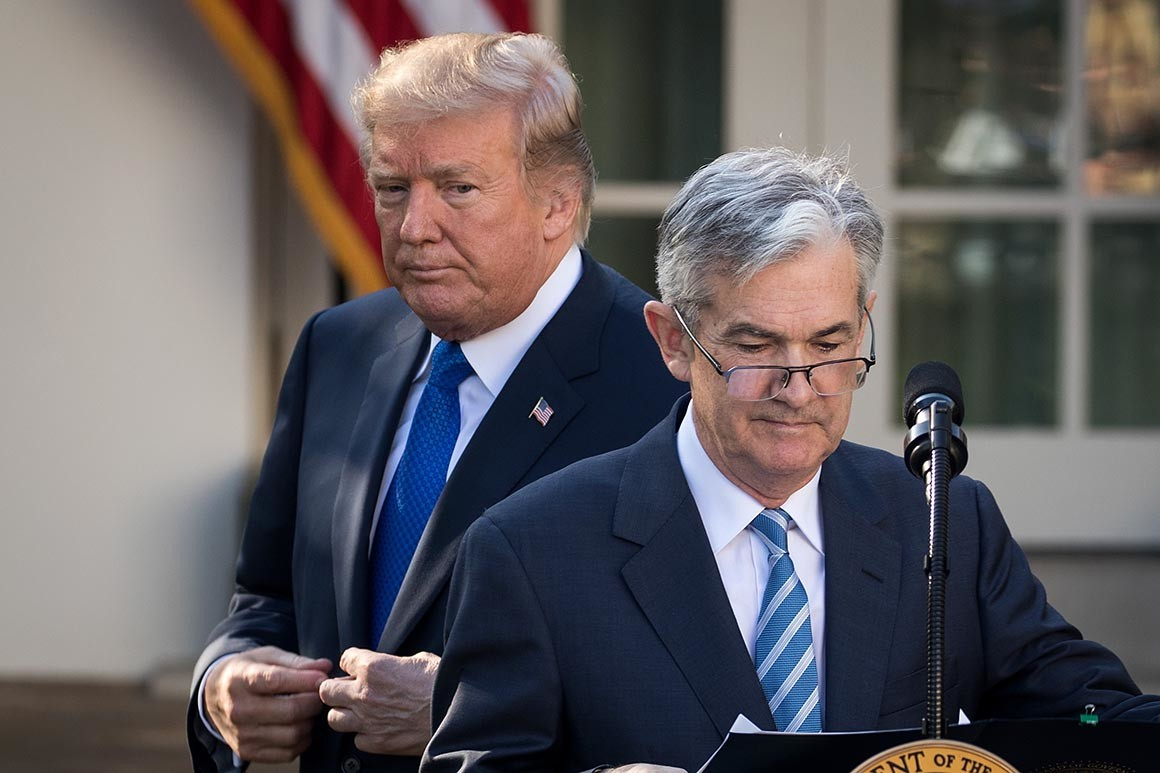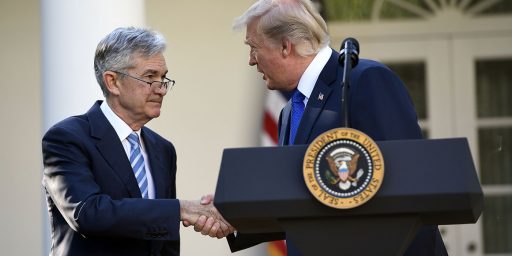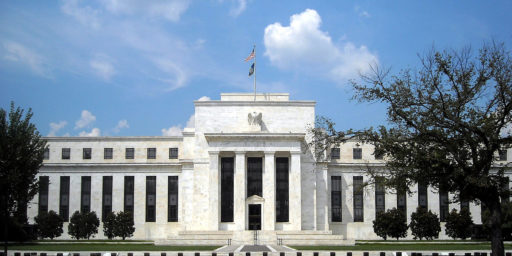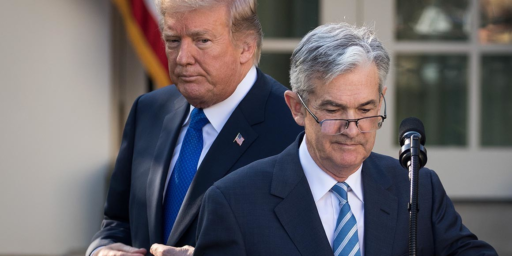Trump Takes Aim At The Federal Reserve Board
President Trump is now apparently on the warpath against the Federal Reserve Board Chairman he appointed only a year ago.

In addition to all of the political headaches that President Trump has faced in the month and a half since the midterm elections, the ongoing Mueller investigation, the decision to withdraw troops from Syria, and the resignation of Defense Secretary James Mattis, the one thing that he could point to as a sign of success seems to be coming back to bite him. The economy and the stock market, which previously had seemed to be doing quite well are starting to show signs of age, and President clearly doesn’t like it. On the economic side, the latest jobs report showed that while the economy is still moving forward it clearly isn’t booming the way Republicans said it would after they passed their tax cut bill last December. On Wall Street meanwhile, where there had been a boom that began shortly after the 2016 election, investors have seen the worst December on record since 1931, and the shutdown is likely to have a negative impact on the markets heading into the new year. Things became even more complicated this week when, as expected, the Federal Reserve Board raised interest rates by the same quarter point they’ve been raising rates on an occasional basis for the past several years. While this was expected, and it was accompanied by an assessment of the economy that should have been good news for Wall Street, the markets didn’t take it that way and markets headed further south.
All of this has led to reports that President Trump is apparently now openly talking about firing Federal Reserve Board Chairman Jerome Powell:
President Donald Trump has begun polling advisers about whether he has the legal authority to fire Federal Reserve chairman Jerome Powell, according to two people familiar with the matter, who described the President as newly furious at the Fed chief as markets tumble.
Earlier this year, Trump’s advisers told the President that it was doubtful he would have the law behind him if he fired Powell. But Trump has renewed the issue after the Fed again raised its benchmark interest rate this week.
So far, the White House hasn’t come to a final legal determination on Trump’s authority to fire his Fed chairman, whom he nominated a year ago. The law states the President can fire a Fed governor for cause, but it hasn’t been tested on the firing of a chairman.
Top West Wing economic advisers have warned Trump that firing Powell would only exacerbate the problem the President is ostensibly trying to solve: nose-diving markets. The unprecedented move would likely cause more turmoil.
Bloomberg first reported Trump’s latest frustrations with Powell.
CNN has previously reported that Trump’s anxiety is mounting about the economy as warning signs of a global slowdown emerge. On days when the market is down double-digits, Trump has surveyed his team about whether he’ll catch the blame. Many have told him he likely will.
Whipsaw markets and a string of steep dives have spawned a pervasive anxiety in the White House, according to senior officials, where for the past two years the strength of the US economy has provided steady reassurance amid even the deepest of political crises.
As Trump faces fresh vulnerability — most aspects of his life are now under investigation just as Democrats are preparing to assume control of the House — the economy no longer offers the same comfort it once did, despite rising wages and the lowest unemployment rate in half a century, according to interviews with multiple White House officials and people close to Trump.
More from Bloomberg:
President Donald Trump has discussed firing Federal Reserve Chairman Jerome Powell as his frustration with the central bank chief intensified following this week’s interest-rate hike and months of stock-market losses, according to four people familiar with the matter.
Advisers close to Trump aren’t convinced he would move against Powell and are hoping that the president’s latest bout of anger will dissipate over the holidays, the people said on condition of anonymity. Some of Trump’s advisers have warned him that firing Powell would be a disastrous move.
Yet the president has talked privately about firing Powell many times in the past few days, said two of the people
Any attempt by Trump to push out Powell would have potentially devastating ripple effects across financial markets, undermining investors’ confidence in the central bank’s ability to shepherd the economy without political interference. It would come as markets have plummeted in recent weeks, with the major stock indexes already down sharply for the year.
White House spokespeople declined to comment, as did Fed spokeswoman Michelle Smith.
Trump’s public and private complaints about members of his administration have often been a first step toward their departures — including former Attorney General Jeff Sessions, his first Secretary of State Rex Tillerson and outgoing chief of staff John Kelly.
It’s unclear how much legal authority the president has to fire Powell. The Federal Reserve Act says governors may be “removed for cause by the President.” Since the chairman is also a governor, that presumably extends to him or her, but the rules around firing the leader are legally ambiguous, as Peter Conti-Brown of the University of Pennsylvania notes in his book on Fed independence.
Such a move would represent an unprecedented challenge to the Fed’s independence. Though he was nominated by the president, Powell was thought to be insulated from Trump’s dissatisfaction by a tradition of respect for the independence of the central bank.
That separation of politics from monetary policy is supposed to instill confidence that Fed officials will do what’s right for the economy over the long term rather than bend to the short-term whims of a politician.
Trump’s frustration with Powell has greatly intensified in recent days, said two of the people. Though Trump’s aim is to stop interest rate increases that slow economic growth, such a move could backfire by roiling already turbulent financial markets.
Even routine changes at the top of central banks create uncertainty in markets as investors try to assess how tough a new leader may be in preventing the economy from overheating and accelerating inflation. Another problem with dismissing a sitting Fed chief may be finding a replacement who wants assurance that he or she won’t succumb to the same fate as Powell.
As noted, it is unclear under existing law whether the President even has the authority to remove Powell as either a Governor of the Federal Reserve Board before his current term expires in 2028 or as Chairman of the Federal Reserve Board itself. The later position carries with it a four-year term which means at least in theory that Powell would be in place until at least 2022 when either Trump would be in the middle of his second term or a new President will be in the middle of their first. In addition to this it should be remembered that, while the Chairman is the public face of the Federal Reserve Board and an influential voice in decision making, he is but one vote on the Board of Governors. By all accounts, the current interest rate policy being followed by the Fed Reserve is unanimously supported by the Board of Governors, although there appears to be some disagreement at the moment among the Governors about how many rate increases may be necessary in the future. In other words, even if Trump does have the authority to remove Powell, doing so would not have any impact on current Fed policy. In order for that to happen, the President would have to remove every single member of the Board of Governors and try to replace them with people whose interest rate policies are more to his liking. (I know what you’re thinking — Don’t give him any ideas, Doug.)
Even if Trump doesn’t follow through with these threats against Powell, the fact that he is even thinking about it is yet another example of the ways in which he is demonstrating that he doesn’t give a damn about political norms or about acting in a responsible and rational manner. If nothing else, the idea of political interference in the financial and monetary markets in this manner is something that can only have negative consequences. For all of its faults, the one advantages of the Federal Reserve Board over the past century has been the fact that it has created a wall of separation between monetary policy and the state. If you want to know why that’s important, you need only to look at the countless examples throughout history of the damage that can be done when political leaders have control of monetary policy. The Federal Reserve has not been perfect, indeed as Milton Friedman demonstrated aptly in his most iconic work it was largely the easy money policies of the Federal Reserve that created the asset bubble and speculation-based economy that led to the Great Depression. Wisely, though, Congress responded to that event by amending the relevant laws that had allowed politics to influence Fed decisions in the early years of its existence. For the most part since then, and especially in the nearly forty years that have unfolded since President Carter appointed Paul Volcker as Chairman of the Fed, the Board has done a good job of getting inflation under control and avoiding situations where monetary policy gets perverted for political ends. Trump would throw that all aside because he doesn’t like the current state of the financial markets and blames the Fed for making him look bad. Thankfully, the law doesn’t make it very easy for him to do anything about that.






Timely piece by Catherine Rampell at WAPO AFTER SHOCK
A recession is coming. Trump will make it so much worse.
She goes on to point out the administration econ team are amateurs, not only with no knowledge, but few contacts in finance and no respect. In the last crisis the US team coordinated an international response, this team won’t be able to. Our only respected, professional line of defense is the Fed.
trump can terminate any member of the Fed “for cause” – https://www.americanbanker.com/opinion/cheat-sheet-can-trump-actually-fire-feds-powell
He’s an idiot, so count on it.
“I’m appointing the new chairman of the Federal reserve, Kevin hassett.”
“welcome back to CNBC we’re now going to Jimmy with news about the stock market. Jimmy?”
“Well the Dow dropped today bill.”
“You didn’t say how far Jimmy”
“All the way bill.”
Isn’t it funny how this fool wants to get rid of the competent people in his cabinet but still sticks with the incompetent people…oh well, birds of a feather…
The issue is not who is the Chairman: that is just a figurehead position. The issue is the power and secrecy of the Federal Reserve, and its effects on the economy and our money. There should be an independent audit of the FR with full disclosure. Meetings of the FR should be open to the public. Some members of Congress have tried to pull back the curtain, but this is resisted.
The director of the FR should come before the public to explain and justify any rate increases.
What happened to the missing $trillions that were loaned out? Senator Sanders and Senator Grayson tried to find out, but did not get far.
See: “A simple history of banking” Very educational. Most people have no idea how banks work. What would happen if tomorrow everyone tried to withdraw their money from the bank?
and – “History of the Federal Reserve” (Corbett Project}
@An Interersted Party: Actually, no, it’s not funny at all. But I don’t think that’s really what you were asking.
@Tyrell: What part of
don’t you get? Stop, please just STOP!!!!!! taking the economic courses offered up at FOX University.
The Fed has a long history of poor decision making and now is no different. They basically left the spigot on too long during Obama’s 2% regime, because they didn’t want it to be 1%. So be it.
They really have no choice but to now let markets adjust to the “correct” rates, reversing their years long immoral jihad against low income/retiree savers with their no yield fixed income instruments posture. The question is how fast, and as usual, they’ve just recklessly slammed on the brakes. That will/has harmed equities investors, who previously benefitted from the prior policy. Oh, well. But this rapid tightening will now more cruelly harm lower income persons through lower investment, higher unemployment and perhaps full blown recession. And it’s unnecessary. There is no harm in a slower pace. Hence Trumps displeasure.
Those who care about the Average Joe will consider this issue through that lens. Those crass individuals who simply look at political advantage and bash Trump at all costs, the Average Joe be damned, will view it differently.
You people ought to look in the mirror and ask yourselves who you really are.
@Tyrell: The issue is dimwits like you believing idiotic conspiracy mongering. Like your ridiculous parroting of the equally idiotic Mueller throne nonsense, this is nothing more than petty bourgeois 3rd rater conspiracy mongering.
and
There are no missing trillions you dim fool.
but go out and buy some gold from the grifters.
@Guarneri: Latest talking points repeated without a tiny ounce of understanding. Obama 2%? Good lord what incoherent nonsense.
@OzarkHillbilly: that stuff looked worse than Fox University. Possibly Prager University, or Trump University.
Does anyone have a memory!? The sainted Reagan sent James Baker to the Fed Chairman (a gentleman named Volker) and kindly asked for his resignation. Which he promptly got and appointed a lovely person named Greenspan in his place. It is possible to locate much of the economic disturbance since to the libertarian nutcasedness that followed that unfortunate choice.
But that was Reagan who is always forgiven. This time it will be Trump. Same dish, same kitchen.
@JohnMcC:
This is simply not true. Volcker was appointed in 1979 by Carter to be Fed Chairman and reappointed in 1983 by Reagan to a second term. His second term ended in 1987 and at that point Reagan nominated Alan Greenspan. Volcker was not forced out and he did not resign. Indeed, the last time a Fed Chairman had resigned was in 1979 when G. William Miller, who President Carter had named to replace Arthur Burns in 1978, was essentially forced out due to the fact that he was seen as not seriously addressing the hyperinflation of the late 1970s, Of course, the President who carried that out was Jimmy Carter and it was, in retrospect, the right decision.
There is no evidence that Volcker was forced out by the Reagan Administration, indeed my recollection at the time was that Volcker wished to move on after holding the Chairmanship for eight years. It’s also worth noting that, under Greenspan, the Fed largely continued the policies that had been set during Volcker’s tenure. The argument that the Greenspan-led Fed was some kind of radical departure from the past is simply not supported by the evidence.
I might have made a serious mistake and will quickly admit to it after doing a bit of looking around. And thank you.
@OzarkHillbilly: I go to Jim Cramer (CNBC), Forbes, BizKids, J. B. Layfield (Fox) , and Phil Town for financial information. Cramer says the Feds actions are creating instability in the market.
Read “Have More Money Now” by John B. Layfield